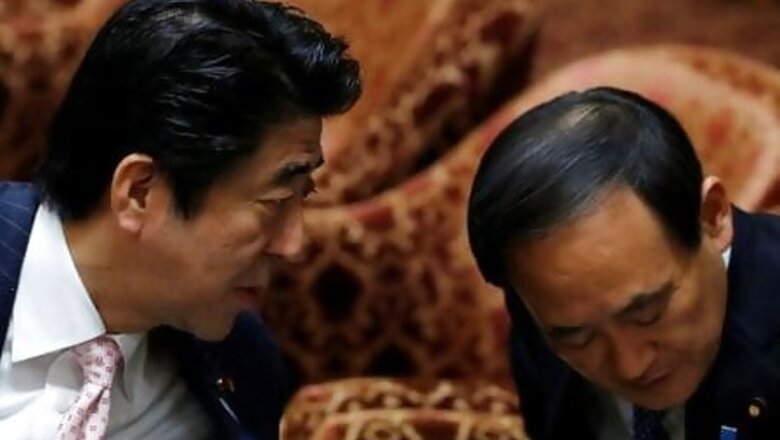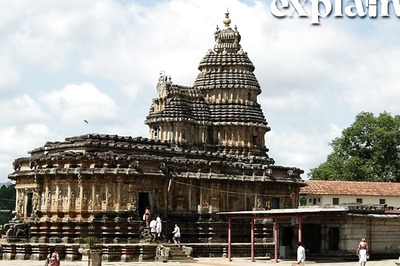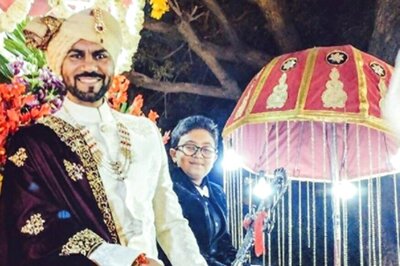
views
TOKYO: In the days leading up to Shinzo Abe’s surprise resignation last month as rumors of his ill health swirled in Japan, the prime minister’s right-hand man, Yoshihide Suga, was courting a ruling party boss whose backing could make him king.
In a secluded dining room in an upscale Tokyo hotel, Suga met with Toshihiro Nikai, the secretary-general of the Liberal Democratic Party (LDP), for a traditional Japanese meal. They shared stories from their youth when they both worked as secretaries for powerful politicians, according to a columnist who dined with them.
The dinner, Nikai’s third with Suga in as many months, came little over a week before Abe stepped down as Japan’s longest-serving premier and highlighted the kind of alliance-building that has made Suga the leading candidate to replace him.
At the dinner, Suga thanked Nikai for keeping a firm grip over the LDP, saying it had allowed Abe’s administration to execute its policies with ease, according to Fumiya Shinohara, the political columnist who was there with them.
Two weeks later, Nikai’s group was the first among the party’s factions to endorse Suga for the top job, support that makes him almost certain to be Japan’s next prime minister.
“In an environment where human relationships are paramount, that has been Mr. Suga’s best weapon,” said Shinohara, adding that their exchange over dinner cemented an alliance now poised to control the ruling party.
Suga’s office did not immediately respond to a request for comment on the dinner. Suga has said, when asked on television about their discussion, that he and Nikai share a similar background and that he had introduced him to various people.
Nikai could not immediately be reached for comment.
For the past eight years, Suga, 71, has been the public face of the Abe administration as the government’s top spokesman but long kept a relatively low profile. He became better known to the public when he unveiled the name, Reiwa, of the new imperial era last year, a celebratory moment that marked the ascension of the new emperor and went viral, earning him the nickname “Uncle Reiwa”.
Behind the scenes, associates and analysts say Suga has been instrumental in shifting elements of decision making from Japan’s sprawling bureaucracy to the premier’s office and taming factional rivalries within the ruling party.
Suga is widely expected to stay the policy course set out by his predecessor, maintaining the “Abenomics” pro-growth stimulus policies aimed at pulling Japan out of deflation and keeping the economy afloat during the coronavirus pandemic.
“Suga will carry on the vision Abe is handing over to him,” said Takashi Ryuzaki, a political analyst and former TV journalist. “So there is no need for Suga to have his own vision.”
‘SOMEONE YOU WOULDN’T NOTICE’
In contrast to Abe, the scion of a political dynasty in Japan who staked his career on constitutional reform, Suga began his political career an outsider and rose through the ranks in local politics.
At a news conference on Wednesday where he officially announced his bid, Suga spoke about growing up in a farming community in Japan’s northern Akita prefecture.
“He was very quiet,” said Hiroshi Kawai, a former high school classmate who still lives in Suga’s hometown of Yuzawa and works as a local tour guide. “He was someone you wouldn’t notice if he was there or not.”
Suga left town soon after finishing high school and worked in a cardboard factory in Tokyo to save money for university. After graduation, he worked as a secretary for a prominent national lawmaker from Yokohama, home to Japan’s busiest port.
During his time in local politics, Suga pushed an ambitious project to redevelop Yokohama’s waterfront, according to Isao Mori, an author who published Suga’s biography in 2016. In the eight years he spent in the city assembly, Suga rose to be known as Yokohama’s “shadow mayor,” Mori said.
‘ACTOR ON A STAGE’
Suga has said he begins most days at 5 a.m., checking the news before doing 100 sit-ups and taking a 40-minute walk. Even among staffers used to the grueling schedules of politicians, he was seen as an outlier for his relentless work ethic.
Daisuke Yusa first met Suga in 2004 when he was working as a salesman for a garbage company. Suga soon recruited him to work as his secretary.
“He used to say, think of yourself as an actor on a stage and think objectively about what position you’re in now,” Yusa said, when asked about perceptions that Suga is more of a lieutenant than a leader.
Yusa, now a local politician, said Suga always emphasized the importance of doing one’s best no matter what the job.
“I think he’s been able to remain in such a position without school ties or political faction because he doesn’t try to stand out,” he said.
Under Abe’s first administration in 2006, Suga headed the ministry of internal affairs where he introduced a hometown tax program, offering tax deductions for those who donate money to local municipalities.
Matsushige Ono, who served as a vice minister under Suga, said the program met fierce resistance from some bureaucrats, who opposed introducing a novel tax scheme without precedent.
“He continued to make his case because he saw how this would help rural communities,” Ono said.
NAVIGATING BUREAUCRACY
When Abe regained the premiership at the end of 2012, he again tapped Suga.
In 2016, facing an ever-stronger yen, Suga created a framework for joint Bank of Japan, finance ministry and banking regulator meetings to signal to investors Tokyo’s alarm over spikes in the yen.
Officials had wanted to create such a framework for years, but friction between ministries prevented it from being implemented.
Mitsumaru Kumagai, chief economist at the Daiwa Institute of Research who frequently speaks to Suga, said Suga has been particularly adept at navigating Japan’s complex bureaucracy.
“He is aware of who and where the key person is in any ministry and he understands how to move organisations by instructing that person,” Kumagai said.
This year, support for the administration went into freefall as the coronavirus pandemic battered an already slowing economy. When Abe’s health began to visibly falter, speculation grew over Suga’s ambitions.
Shinohara, who joined the August dinner between Suga and Nikai, said the two men had bonded over their similar backgrounds.
“There are a lot of politicians now who can give good speeches and others from bureaucracies who can manage policy, but he’s the kind of professional politician who has his own distinct smell,” he said.
After dinner, the men left the hotel separately as journalists snapped pictures. A day later, Suga was asked on a TV programme whether he was interested in running for the prime minister’s job. Laughing, he said: “Not at all.”
Disclaimer: This post has been auto-published from an agency feed without any modifications to the text and has not been reviewed by an editor



















Comments
0 comment